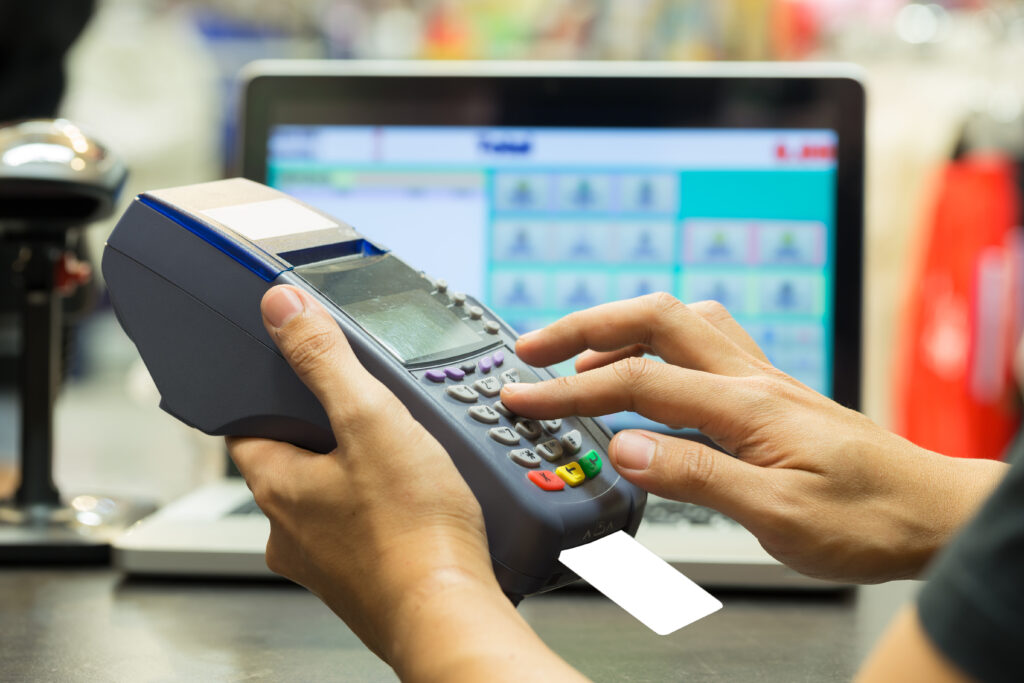Table of Contents
Here are the 10 Best Secured Credit Cards for Building Credit
There are many options out there for secured credit cards so it can be easy to get overwhelmed by all the choices there are. Secured cards are offered by most banks and credit unions. In fact, if you already have an established account at a bank or credit union, that should be your first stop if you want to open a secured card.
Credit card issuers offer secured products to help those with poor credit who won’t qualify for an unsecured credit card. Secured credit cards don’t offer cash advances, balance transfers or any of the other perks of a traditional credit card account.
Once you’ve used your secured credit card to build up a little bit of credit history, establish a pattern of responsible use and improve your creditworthiness, will be it easier to “upgrade” your account to an unsecured credit card account with a higher credit line.
In addition to banks and credit unions, secured cards are also often available through financing portals and independent companies. It is important, though, to keep in mind that not all secured cards or loans are created equal. Many offer limited credit, and the initial deposit requirements will likely differ. And while there isn’t usually an application fee, several companies charge an annual fee for their products. Be sure to read the card details and know the minimum deposit amount before you apply.
Here are some of the best secured credit card offers currently available on the market.
1. Chime Credit Builder Visa Secured Credit Card

The Chime Credit Builder Visa Secured Credit Card works a little bit differently than the other secured credit cards on this list. Before we explain why, here is the important information you need to know about Chime’s secured card:
- No credit check required
- No minimum deposit required
- No credit limit
- Reports to the major credit bureaus
- 0% interest
- $0 annual fees
- $0 foreign transaction fees
- $0 maintenance fees
All you need to set up your Chime Secured Card is the following:
- A Chime Spending account
- Qualifying direct deposits totaling a minimum of $200 within the past year of your application date.
It works like this: When you open your Secured account, you transfer money from your Spending account. The amount you transfer serves as your “credit limit” (as far as the credit bureaus — Equifax, Experian and TransUnion — are concerned). Over the next month, you can spend up to how much you have deposited (like a checking account or debit card). When your payment comes due, simply replenish your account. However much you deposit serves as your new spending limit. You essentially set your own credit line.
If you make sure to replenish the account each month, your payments will be reported to the credit bureaus and help raise your score!
Unfortunately, Chime’s secured card doesn’t offer any rewards program or cash-back rewards. The perk is in the flexibility it offers.
READ MORE: Chime review
2. Self Visa Credit Card

Like Chime, the Self Visa Credit Card differs slightly from a “traditional” secured card. Here’s the important information:
- No credit check required
- $100 minimum deposit required
- Variable credit limit
- Reports to the major credit bureaus
- Variable APR
- $25 annual fee
- $0 international fees
- $5-$15 late payment fee
Self is an interesting creditor because, instead of applying for the card itself, you first have to open a Self Credit Builder account. This does require a hard pull on your credit, but if you meet their (incredibly lenient) requirements, you’ll be approved.
The Credit Builder Account is, essentially, a loan that you pay in advance. You decide what your monthly payment should be and how many months of payments you will make. This results in a total amount of money that you will be “lending” yourself. The monthly payments are put into what is basically a savings account. If you make each of your agreed-upon monthly payments on time, Self then gives you access to that savings account to do with what you wish, minus whatever amount you have set aside as a security deposit for your secured Visa card.
The secured Visa card is the other way that Self helps you rebuild your credit. Once you have made a minimum of three consecutive on-time monthly payments and have managed to save $100, Self gives you the option to use a portion of that money as a security deposit for a secured Visa card. You don’t have to apply for the card because you had to apply for the Credit Builder account.
Like with other secured cards, the amount of money you set aside in your security deposit will determine your credit limit. If you ever want to raise your credit limit, you can do that — if funds are available in your Credit Builder account.
Self reports your payments to your Credit Builder account and secured Visa card to the major credit bureaus.
3. Secured Mastercard from Capital One
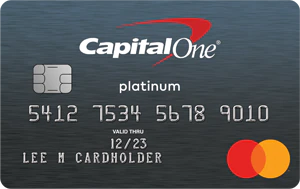
The Secured Mastercard from Capital One is a “traditional” secured card. You need to apply and agree to put down a security deposit, which typically becomes your credit limit. Capital One reports your payment history and your credit utilization ratio to the three major credit bureaus. And, after six months of on-time payments, cardholders have the chance to be automatically approved for a credit increase.
It also offers cardholders the ability to “earn back” their security deposit, which is applied to the account as a “statement credit” (which means you won’t necessarily be given back cash, you’re more likely to have the amount of your security deposit applied to your balance.)
Here is the other information you need to know:
- Credit check required (though you can pre-qualify without it affecting your credit score}
- $49-$200 security deposit required
- $200 max initial credit limit
- Reports to the major credit bureaus
- 29.74% variable APR
- $0 annual fee
- $40 maximum late payment fee
4. Discover It Secured Credit Card
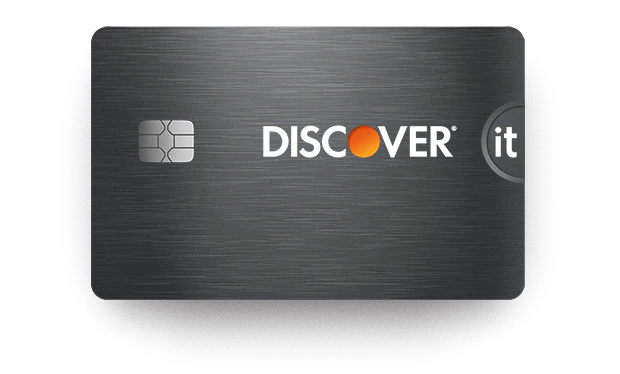
The Discover It Secured Credit Card is a favorite among financial experts, credit noobs, and credit repairers. Here’s the important info:
- Credit check required
- $200 minumum security deposit required
- Security deposit determines initial credit limit
- Reports to the major credit bureaus
- 27.24% standard variable APR on purchases
- $0 annual fees
- $0 foreign transaction fees
- $0 overlimit fees
- Offers free alerts if your social security number is found on the dark web
- This is one of the few secured card options that offers an intro APR, at 10.99% for the first six months — but you’ll pay a 3% balance transfer fee
Like the other cards, your security deposit will determine your Discover It® card’s credit limit. And, like most other cards, there are no annual or over-limit fees. You’ll also be automatically evaluated for a credit limit increase or “graduation” to an unsecured card. Discover starts doing this every month as soon as you’ve gone eight months without going over your limit or missing or making late payments.
What makes Discover It® superior to many other secured cards is that it offers you perks. You can decide whether you want cash back or points toward purchases on Amazon or other sites. You also have the chance to earn back your security deposit — as a direct payment to you, not just a payment applied to the balance on your card.
5. Merrick Bank Secured Visa Card
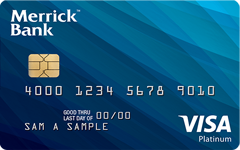
The Merrick Bank Secured Visa Card is a pretty standard secured card. Here’s the important stuff:
- Credit check required
- $200-$3,000 security deposit required
- Security deposit determines credit limit
- Reports to the major credit bureaus
- 21.70% standard APR
- $36 annual fee for the first year/$3 every year after that
- 2% foreign transaction fee
- $40 maximum late payment fee
This is a great card if you need flexible approval terms (they’re about as lenient as you can get) and the ability to increase your credit limit. Unlike the others mentioned so far, Merrick allows you to increase your credit limit whenever you want. You simply have to add funds to your security deposit.
The downside, of course, is the fees. While the APR is the lowest on the list (so far), the other typical account fees are higher. That is something to keep in mind when making your decision.
6. Applied Bank Gold Preferred Secured Visa Credit Card

The Applied Bank Gold Preferred Secured Visa Credit Card is an interesting, secured card. Before we get into the review, here’s the important info:
- No credit check required
- $200 minimum deposit required
- $5,000 maximum credit limit
- Yes, reports to the major credit bureaus
- 9.99% fixed APR
- $48 annual fee
- 3% foreign transaction fee
- $0 maintenance fees
Applied Bank’s Gold Preferred secured card sounds almost too good to be true — the website “guarantees approval” with “no credit check.” Like the other cards, your security deposit determines your credit limit. What is concerning are the fees. An automatically deducted annual fee of $48 (starting on the day you are approved), no grace period for payments, and a $12.50 charge for payments made over the phone will add up quickly, so be careful!
7. PCB Secured Visa Card
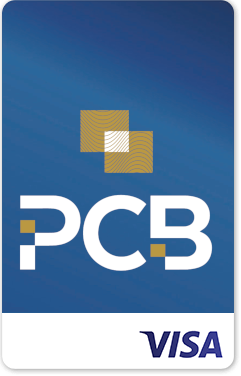
The PCB Secured Visa Card looks like a standard-issue secured card. Here are the important details:
- No credit check required
- $200 minimum security deposit
- Security deposit determines credit limit
- Reports to the major credit bureaus
- 18.90% APR
- $39 annual fee
- 1% maximum per purchase In USD international transaction fee
- Late and/or returned payment Fee: $40
PCB markets its secured card both to people who are just starting to build their credit history and to those who are interested in repairing and raising their credit scores. It doesn’t look like they run a credit check, but they do run a background check to make sure applicants are who they say they are. The fees aren’t great, but they aren’t unreasonable either. All in all, this is a solid choice if you are in the market for a secured card.
8. First Progress Platinum Prestige Mastercard Secured
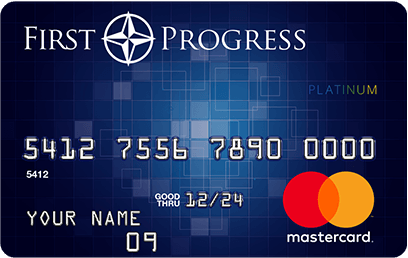
Another solid choice for a secured card, here are the specifics about the First Progress Platinum Prestige Mastercard Secured:
- No credit check required
- $200 minimum security deposit
- Security deposit determines credit limit
- Reports to the major credit bureaus
- 14.24% variable APR
- $49 annual fee
- 3% foreign transaction fee
- Late payment fee up to $40
- Returned payment fee up to $29
First Progress offers three different types of secured credit cards. If you qualify for the Platinum card you will likely qualify for the other two as well. The primary differences between the three are the interest rates and fees. The Platinum card is the most expensive fee-wise but offers the lowest interest rate. This card is also great because, although there is an annual fee, there aren’t any monthly maintenance fees (at least not any that were listed on the paperwork)! This is a great option for those who need to rebuild their credit.
9. OpenSky Secured Visa Credit Card
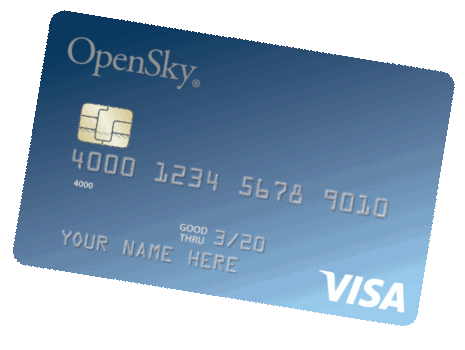
OpenSky is one of the most visible secured card companies out there, and for good reason! Here are the important details about the OpenSky Secured Visa Credit Card:
- No credit check required
- $200 minimum deposit
- Security deposit determines credit limit—up to $3,000
- Reports to the major credit bureaus
- 21.64% variable interest APR
- $35 annual fee .
- 3% foreign transaction fees (charged in USD)
- Late payment fee: up to $38
- Returned payment fee: up to $25
At first glance, OpenSky looks like a standard secured card. What sets this company apart, though, is that it sets cardholders up to succeed. Cardholders pay interest that is on the high end, but the fees are lower than average. They are also given access to tools like notifications if someone is near their credit limit, and access to credit monitoring tools. This is especially helpful for those who aren’t yet used to managing a credit card and its payment system.
10. Citi Secured MasterCard
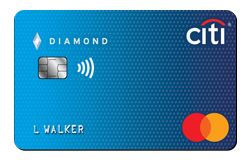
Citi’s secured card is an entry-level product designed to help you build credit. Here are some of the key details:
- No annual fee
- $200 minimum deposit
- Deposit determines credit limit — up to $2,500.
- 26.74% variable APR
- Reports to all three major credit bureaus
- 3% foreign transaction fee (charged in USD)
- Late payment fee: up to $40
- Returned payment fee: up to $40
The Citi Secured Mastercard will help you if your credit score is less than ideal and you want to fix that. It’s also a good option for someone who is just starting out and has no credit at all or for someone who hit a rough patch and watched their credit score plummet. Then, once you’re back on track, you can look for a credit card with a higher credit limit that offers you some rewards as a bonus.
What is a Secured Credit Card?
A secured credit card is a line of credit that requires the applicant to offer up something as collateral to “secure” the debt. The amount of credit extended to the applicant is typically equal to the monetary value of whatever is offered up as collateral.
This collateral is almost always a monetary deposit. That deposit is set aside in a sort of savings-like account that is controlled by the company issuing the secured card.
As long as the cardholder makes their card payments on time, that deposit remains untouched by the creditor. Eventually, maybe as soon as the end of your first year, the cardholder keeps their secured account in good standing the creditor will refund the security deposit and either close the account or “upgrade” it to an unsecured account.
What Credit Score is Needed for a Secured Credit Card?
This depends on the card issuer’s requirements. The good news is that there are a lot of secured cards that don’t have a specific minimum credit score requirement. In fact, there are plenty of card issuers who don’t even check an applicant’s credit. Therefore, it is often seen as a great way to help people with damaged credit repair their scores.
READ MORE: How to get a free credit score
How Does a Secured Credit Card Work?
A secured credit card works exactly the same way as an unsecured credit card, only the account is prepaid. Think of it as a refundable security deposit. The card is used to pay for something and then the cardholder pays off that amount. They can pay it off in full (highly recommended) or pay it off a little at a time (less recommended). Interest is levied against any balances that are carried from one payment period over into the next.
The primary difference is what happens if a secured cardholder defaults. With an unsecured card, the account is sent to collections. With a secured card, if a cardholder defaults, the amount of money they put up as collateral is used to pay off the balance.
Both types of default get reported to the credit bureaus, though, so it’s definitely important to be responsible with a secured card!
READ MORE: Is no credit better than bad credit?
This video will explain how a secured credit card can help you build credit.
In a nutshell:
- After you’ve paid your deposit, it works like a traditional credit card.
- The cardholder can use the card anywhere credit cards are accepted, including online.
- Your bill is paid monthly, and you pay for your purchases as usual, but the deposit does not go toward your card balance.
- On-time payments and regular card use will help you build credit. A single late payment will stay on your credit report for up to seven years.
- If you carry a balance, you will pay interest.
- Credit card issuers usually offer both secured and unsecured cards.
- The cards sometimes charge an annual fee of up to $50, but plenty of options don’t include a yearly fee.
- If you don’t qualify for an unsecured card, a secured card can help you build your credit as long as you use it responsibly and pay it on time.
- Offers fraud liability in case your card is lost or stolen.
Benefits vs. Drawbacks of a Secured Credit Card
A secured credit card works exactly the same way as an unsecured credit card, only the account is prepaid. Think of it as a refundable security deposit. The card is used to pay for something and then the cardholder pays off that amount. They can pay it off in full by the due date (highly recommended) or pay it off a little at a time (less recommended). Interest is levied against any balances that are carried from one payment period over into the next.
In terms of drawbacks, the amount of credit you get will be determined by how much collateral you can afford to put up. Most card issuers require new cardholders to keep their credit limits pretty low, at least for the first few months or the first year. This means you are more likely to use a higher percentage of your available credit, which can have a detrimental effect on your credit score.
How to Use Your Secured Credit Card to Build Credit
- Use it for emergencies only, and make one or two small purchases per month.
- Keep your account in good standing. Always pay your bill on time.
- Don’t allow your balance to exceed 30% of your credit limit.
- Pay your balance in full each month. This way, you won’t have to pay interest charges.
- Monitor your credit score. When you see a noticeable increase, ask about qualifications for an unsecured card.
Why is it Important to Build Credit?
Your credit history serves as a sort of permanent record for your adulthood. It is what landlords, mortgage brokers and even potential employers use to evaluate how financially responsible you are. They use your credit report and history to decide whether to hire you, rent to you, what interest rate you’ll pay on your car loan — or if you’ll be approved for a car loan at all!
The higher your FICO score and better your credit history looks, the lower the rates will be for loans, mortgages, etc. You’ll also pay less in security deposits on apartments.
How Quickly Does a Secured Credit Card Build Credit?
It can also take one to two months after you begin using your secured card for it to start bumping up your score. According to Experian, if you’re brand-new to building credit, it could take up to six months for a credit score to appear on your report.
But after the first year to 18 months of use, your credit score should be reflected and have improved enough to qualify for an unsecured card.
READ MORE: Best credit-builder loans
What If My Application for a Secured Credit Card is Denied?
You will get denied if you have bad credit or a bankruptcy on your credit report. You’re entitled to a free credit report to determine why this happened. And you can also get copies from all three major credit bureaus — Experian, Equifax and TransUnion at annualcreditreport.com. Review them for any potential problems, and if you find any errors, fix them.
Secured Cards vs. Unsecured Cards
The primary difference between secured and unsecured cards is how available they are to you. An unsecured card is your best bet if you have a good credit history. They offer perks, higher limits, lower interest rates, etc.
The secured card is best if you’re new to credit or if your credit needs repair. Applying likely won’t affect your credit score; they are easier to get and won’t be sent to collections if you default (provided you default for less than your credit limit).
Alternatives to Secured Cards
If you need financing right now and can’t come up with a security deposit for a secured card, try not to panic. There are alternatives out there that might be helpful to you.
Unsecured Cards for Bad Credit
Unsecured credit cards are out there for people whose credit history is less than awesome. The Surge Mastercard mentioned above is one of these cards. The credit requirements for these cards are more lenient for applicants. The interest rates and fees are usually very high, though, so make sure you do your research and read the card offers closely before filling out any applications.
For Example, the Surge MasterCard® Credit Card
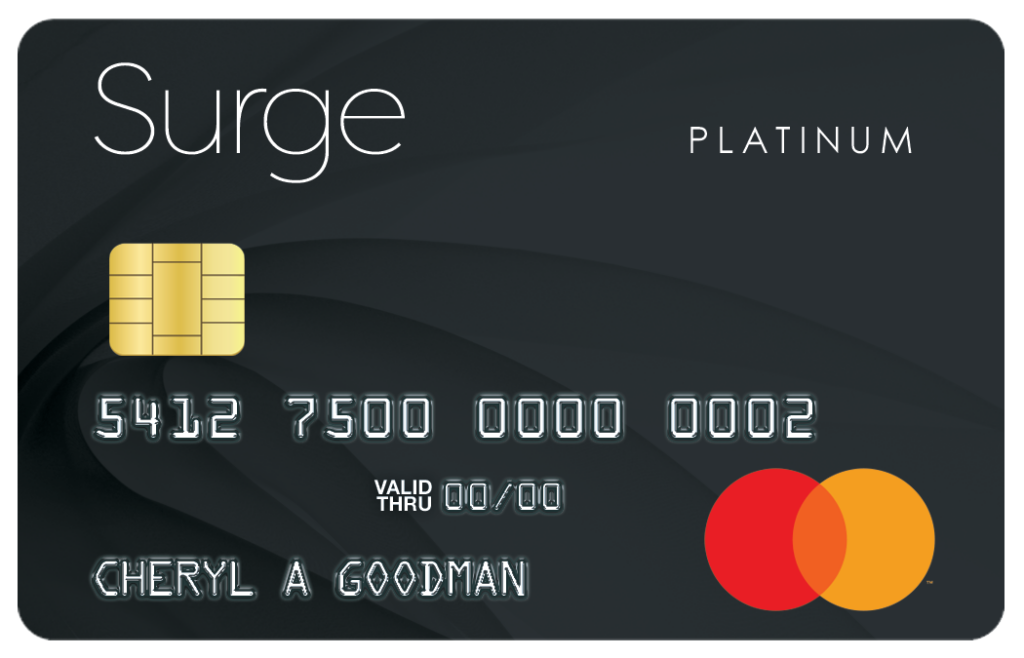
The Surge MasterCard® Credit Card isn’t a secured card at all, but a “traditional” unsecured credit card. Here’s the important stuff:
- Credit check required
- No minimum deposit required
- Credit limit: $300-$1,000
- Reports to the major credit bureaus
- 25.90% to 29.99% variable APR
- $125 annual fee the first year, $96 annually every year after
- 3% foreign transaction fee
- $120 in annual maintenance fees (billed monthly at $10)
The Surge MasterCard is a card meant for people with bad credit who are interested in raising their credit scores. The company is pretty stingy with its eligibility criteria — it wasn’t listed on its website. They also charge huge interest and other fees. If you’re desperate, this card might be tempting, but otherwise, it’s probably best to only turn to it as a very last resort.
READ MORE: Best credit cards for borrowers with bad credit
Secured Lines of Credit
A secured line of credit is sort of like a secured card. But, instead of a security deposit serving as collateral, applicants use a savings account or real estate to serve as collateral. These lines of credit are used for larger expenses, and because the creditor can’t collect the asset if you default on payments, they are harder to get.
Secured Loans
These are sometimes called “title loans” because the most common collateral used to “secure” the loans are the titles to cars or homes — the kind of collateral that can be collected if a borrower defaults on their loan payments. The rates and fees on these loans are usually steep. Make sure you take your time and dig into the details of each secured loan you are considering applying for.
Another type of secured loan is one that some online platforms, like PayPal, make available to account holders whose transaction histories meet the platform’s eligibility criteria. Borrowers get approved for a specific amount (credit limits vary). Instead of requiring the borrower to make minimum monthly payments on a specific date each month, the payment platform then takes a percentage of every payment that gets deposited into the borrower’s account.
These loans are good options for freelancers and gig workers who don’t have the type of direct deposits many other lenders require. The only real drawback is that positive repayment history doesn’t get reported to the credit bureaus.
Other Bad-Credit Loans
The most common bad-credit loans are payday loans and installment loans. These can be quite helpful if you need an amount right now and are absolutely sure you’ll be able to pay off the loan on time. The loan repayment period is usually quite short—typically, they require payment on your next payday (hence the name payday loan) or 3-6 months. The fees on these loans tend to be extremely high, so tread very carefully with these loans.
READ MORE: Best debt consolidation loans for bad credit
Peer-to-Peer Loans
Depending on your situation, one of the peer-to-peer lending sites could be an option for you. You’ve probably heard about sites like Kiva, which specialize in loans for minorities and for people in developing parts of the world, right? There are sites like that for the general population, too.
Sites like Prosper, Peerform and Funding Circle are good places to start if you can meet their lending criteria.
If you’re worried about your credit score and credit history making you ineligible for sites like that, there are also a few P2P lending groups on Facebook and Reddit. The r/borrow subreddit is a good example of this, especially if you’re a Reddit user who has built up the required karma and posting history.
If you aren’t a Reddit regular, there are similar groups on Facebook. Groups like Give Me Your Money, etc., exist to help people who need money to connect with people who have money they want to share. The bar to entry for these groups is super low, but your posts must meet very strict criteria before they will be approved.
READ MORE: Best peer-to-peer loans for bad-credit borrowers
Borrowing from Friends or Family
It might hurt your pride, but loans from friends and family can be what help you deal with emergencies. The nice thing about these loans is that, while some people might charge you interest, your repayment history won’t get reported to the credit bureaus and the payments/re-payment plans are pretty flexible.
Authorized User
If you can’t get anybody to loan you money directly, you might be able to get someone to add you as an authorized user to one of their existing loans or lines of credit. This typically doesn’t require a credit check. Still, it can help you build a positive repayment history since these loans and lines of credit are reported to the credit bureaus—not just for the main account holder but for every authorized user on the account.
The Bottom Line
Take your time and make sure to read up on each potential company’s terms, conditions, fees, etc. It is important that you know exactly what you will be agreeing to before you fill out an application. After all, isn’t the goal with a secured card is to set yourself up for success, right? Right!
FAQs
Closing accounts that are in good standing is never a good idea for your credit report. You want to keep accounts open so you can keep your credit usage/availability usage ratio low. At minimum you should keep the card for however long it takes you to build up a six-month streak of on-time payments, minimum.
Not really. Having the card and leaving it unused is good for your usage/availability ratio. It is better, however, to use the card. The trick is to only charge as much as you can afford to pay off in full every month. This will help you build a positive repayment history as well as keep your usage/availability ratio low.
This depends on the company that issued the cards and the terms of your agreement. Some lenders will “upgrade” you automatically after a specific amount of time has passed—if you’ve kept your account in good standing. Others will give you the option to apply for unsecured status after you’ve managed to accrue several months in a row of on-time payments.
Not necessarily. If you make your payments on time and in full for six months to a year (this period varies from creditor to creditor), most secured card companies will refund your initial security deposit. If you default on your payments, though, you will lose your security deposit and likely end up owing money as well.
It can! Some secured card companies will allow you to increase your limit whenever you want, you simply have to deposit more money into your account. Others will let you ask for credit limit increases after a few months of on-time payments have passed. Check your agreement, the details will be in there.
If you have never had a credit card or a loan, a secured card is a great way to begin building a positive credit history with relatively low risk.
If your credit score is low or your credit history is bad, a secured card is a good way to begin raising your score and repairing your history. The risk is a little higher in this scenario since, if you default on this card, it will bring an already low score down, but if you feel like you will be able to make your payments on time, a secured card could be the exact rehab tool your credit needs.
Either way, if you need funds, you might be tempted to apply for every secured card and secured loan you can find. Resist this temptation!
All of the major financial institutions, many online banks and most credit unions offer secured credit cards. In addition to the cards recommended, US Bank and Bank of America also have popular offerings.

